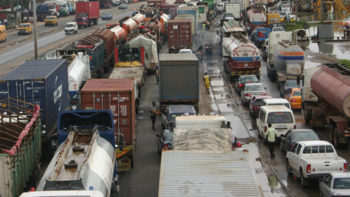
According to the World Economic Forum, the biggest challenge Nigeria faces, which impedes its global competitiveness, is inadequate and weak infrastructure. The rail transportation that is the darling of other countries for freight is almost non-existent in our country. Amazingly, we keep having lofty visions to make Nigeria a top economy yet we are not moving in the direction of what top economic giants do. There is even a subsisting Vision 2020 that seeks to make Nigeria one of the top 20 economies by the year 2020. But the weakness in our plans and visions is the shallow attention we pay to the things that really matter. And when we attempt to address such issues our approach is usually scanty. The lack of rail transportation designed to support the nation’s port business is an anomaly that requires urgent intervention. This is further compounded by the deficiency and short-sightedness in our planning and concentration of seemingly beneficial projects. The two major problems confronting the Apapa metropolis today are the lack of rail transportation and the concentration of tank farms without adequate planning. The presence of one and the lack of the other is one of the biggest contributors to the ever-present chaos in Apapa and a debilitation to the full growth of the maritime industry in Nigeria.
The Minister of Transportation, Rotimi Amaechi recently hinted of plans to ease the traffic congestion in Apapa. He stated that the government has concluded arrangement for the supply of 100 wagons and 60 locomotives to ease the movement of cargoes out of the port. Consequently, importers will now take delivery of their cargoes cleared from Lagos ports at Papalanto in Ogun State via rail lines. This ordinarily should serve as a positive development. Nevertheless, solving the problems in Apapa goes beyond redirecting cargoes to Papalanto because without adequate and holistic planning, this might turn out to compound the traffic congestion in that area without necessarily reducing the congestion in Apapa. Aside from the import bound trucks in Apapa, the other major concern is tankers lifting fuel from the tank farms. The traffic situation in Apapa was not as bad as it is currently before the construction of the tank farms. And as a result of the scandalous condition of the other depots in the country, tankers from 36 states of the federation have to lift petrol from the Apapa tank farms. And as indicated by the South-West Chairman of NUPENG, Mr Tokunbo Korodo, 90% of the petroleum products used in the country is stored in various tank farms in Apapa. So any relocation that does not take into consideration the tank farms may not eventually decongest traffic in the metropolis.
The solution to our predicament does not lie in makeshift arrangement or politically correct piecemeal moves. The solution lies in strategic planning that takes into consideration all the major concerns of stakeholders. So long as tank farms for petroleum products are located in Apapa and our nation still relies on road transportation for freight, the chaos in Apapa may not disappear anytime soon. Currently, if an assessment is to be conducted on the bridges leading to the Apapa ports, findings will show nothing but how weak the bridges have become owing to the magnitude of weight they have to carry. Confirming this fear, the Lagos State Sector Commander of the Federal Road Safety Corp (FRSC), Mr Hyginus Omeje recently warned of the deterioration of the bridges in the area, but no one seems to be listening. For more than 3months now, the Eko Bridge and the Ijora Bridge have been become the natural parking lots for truck drivers who have no designated place to park their heavy duties. Even the strongest bridges cannot survive this unending misuse. To address the looming danger, NUPENG recently called on the federal government to intervene and create tank farms in other parts of the country as a way of decongesting the Apapa metropolis. But rather than heed to the call, the government is issuing approval for more tank farms.
We are endangering human lives just as much as we are killing the economy by not doing the right things. The government urgently needs to decongest the tank farms in Apapa and create alternate locations for fuel tanker drivers to load fuel. If Papalanto becomes the new point for importers to clear their cargoes and Apapa remains the tank farm hub in Nigeria, we have done nothing but to replicate traffic congestion in Papalanto while we continue to bear the shame in Apapa.
As we prepare for fuel sufficiency by 2019 when the Dangote refinery will come on board, it is important to maximise the opportunity the project presents. Of what benefit would it be when we eventually have functional refinery yet we still have to contend with congestion in Apapa because most tank farms are located there? The government should mandate relevant agencies such as the PPMC working with the private sector to begin the construction of fuel depot in strategic locations in the country. If not the disorder in Apapa will get out of hand someday and our nation will suffer for the inactions.
Copyright Ships & Ports Ltd. Permission to use quotations from this article is granted subject to appropriate credit given to www.shipsandports.com.ng as the source.